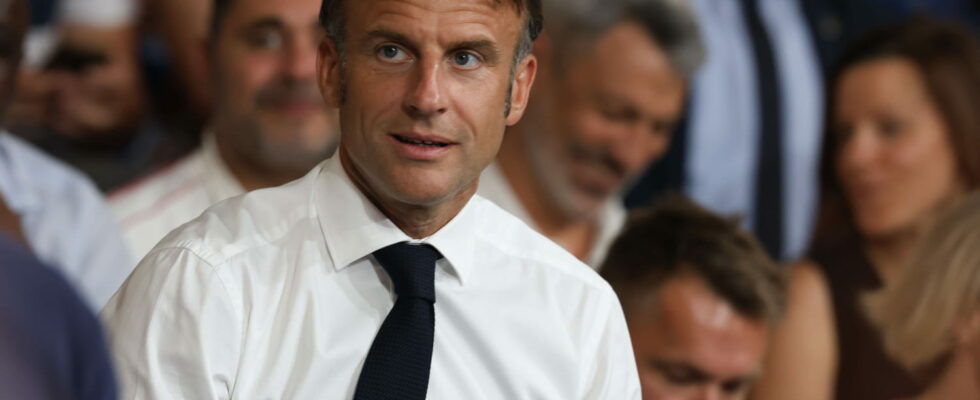According to the Constitution, Emmanuel Macron is the sole master of the appointment of his future Prime Minister, even if many factors must be taken into account. That being said, the deadline may not be so far away.
If during his interview on France 2, on July 23, Emmanuel Macron announced that he would not appoint a Prime Minister and government before the end of the Olympic Games and called for a “political truce”, this could happen in the days following the event. According to Le Parisien, this nomination could fall between August 11 and 15. A Council of Ministers will be convened on August 12.
The president will have to find a prime minister capable of rallying the support of at least 289 deputies, to ensure stability, while the last legislative elections gave the New Popular Front the victory in terms of number of seats but without an absolute majority. Otherwise, the new government would be exposed as a whole to a motion of censure which, if voted for by more than half of the elected representatives, would lead to the overthrow of the ministerial team. Everything would therefore have to be redone.
Even if some are advancing on the nomination of a future Prime Minister, only the President of the Republic is able to appoint the head of government as provided for in Article 8 of the Constitution: “The President of the Republic appoints the Prime Minister”. But his choice is constrained by other factors. If the 37-year-old senior civil servant, Lucie Castets, was designated by the New Popular Front to occupy the post of Prime Minister, Emmanuel Macron has already firmly indicated that she will not be appointed Prime Minister, like any other personality with the ambition of leading a left-wing government. In fact, the Head of State has only one scenario in mind, that of appointing to Matignon the head of a coalition government, with majority support in the National Assembly. According to the Elysée, the next Prime Minister will have “a scent of cohabitation”.
A coalition with the Republicans?
Emmanuel Macron could therefore be tempted to move towards a coalition government between Renaissance and Les Républicains. The presidential camp at the head of the Ensemble coalition has 168 deputies while the right has 60, the two united groups would therefore have nearly 230 deputies and become the majority. The two political parties have already agreed on several projects since Emmanuel Macron’s re-election in 2022 and have made it possible to pass laws despite the relative majority of the presidential camp. A coalition therefore seems possible, but the right is reluctant to once again play the role of crutch for Macronist elected officials. Behind the scenes, Édouard Philippe, capable of bridging the gap between Macronism and the right, is trying to convince the Republicans. In addition, the presidential camp and the right have joined forces for the election of Yaël Braun-Pivet to the rostrum.
If such a coalition were to emerge, the Prime Minister could come from the Macronist camp, more specifically from the right wing, but also from a center-right party like Horizon or from the moderate right. The Republicans would set as a condition for a coalition the appointment of a right-wing Prime Minister without giving a name. The fact remains that some are positioning themselves, like Xavier Bertrand, who imagines himself at Matignon after having built a coalition involving the right, the presidential camp but also the left. The possibility of Bernard Cazeneuve, former tenant of Matignon under François Hollande, was also mentioned by Le Parisien. The latter said he was “ready” for a technical or consensus government.
Macron free to appoint whoever he wants to Matignon
Whatever the opposition says, they have no say in the appointment of the Prime Minister, which is the sole responsibility of the Head of State. Cohabitation does not change this rule, and no special measures are provided for in the Constitution in the event of cohabitation. However, there is a case law that has been valid since the first cohabitation of the Fifth Republic, which occurred in 1986 under the presidency of François Mitterrand. “The President of the Republic appoints whoever he wants. He must naturally place himself in conformity with the popular will. […] “I will have to address a personality from the majority to lead the government” declared the man who was the head of state.
This principle was respected during the other two cohabitations of the Fifth Republic. The previous cohabitations also confirmed the tradition of appointing the leader of the opposition, without this being an obligation. However, this is not really the path that Emmanuel Macron seems to want to take for the start of the school year. He could impose his choice of Prime Minister, and not appoint a left-wing personality, in line with the results of the last early legislative elections. For the time being, the resigning ministerial team, with Gabriel Attal as leader as the resigning tenant of Matignon, remains in place.
A choice forced by the threat of a motion of censure
If the law does not constrain the President of the Republic in the choice of the Prime Minister, the parliamentary majority can. Hence the demands and the positions of the different parties imagining themselves to win the election. Once appointed, the Prime Minister with his government is responsible to the Assembly and can at any time be overthrown by a motion of censure if he is not assured of the support of at least half of the elected representatives. The Constitution then provides for the forced departure of the head of government. This is why the Prime Minister is chosen according to the majority present in the hemicycle: without this he knows that he could be forced to resign if a motion of censure is voted.
